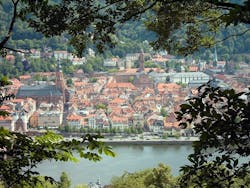Waterleau Group announced that it has commissioned a biogas power plant in Bergheim-Paffendorf, Germany, as part of an effort to increase energy efficiency for the region and test new technologies. The facility has a thermal capacity of 7.4 MW and is designed to feed up to 700 cu meters of biogas into the Thyssengas gas grid, making it one of the most efficient plants in Germany. A total of €13 million has been invested in the plant.
“We’re proud of this project because it showcases our commitment to innovation and helping clients go green,” said Bart Goedseels, Waterleau CEO. “The design’s complexity combined with the focused project management and the plant’s excellent performance makes the Bergheim biogas plant a great example for future projects.”
The plant was designed and built by Waterleau Group in partnership with the State of North Rhine-Westphalia, Germany’s primary energy-producing region, and RWE International SE, a leading European energy company. RWE is participating in a range of research projects designed to reduce the costs of building and operating renewable energy facilities. The plant has been in operation for eight months now, with biogas yields exceeding expectations. The new biogas plant will improve energy efficiency.
The plant will upgrade raw biogas produced at the facility to natural gas quality on the spot and feed it into the gas grid operated as bio methane, making it available to the region’s combined heat and power stations. It will generate bio methane that can be used to supply heat to 3,300 households each year or to generate carbon-neutral electricity.
It will use a broad mix of raw materials supplied by regional agricultural producers. The feedstock includes grass, maize, and whole crop silage, as well as sugar beet, lucerne, forage rye and agricultural fertilizers. The use of new types of energy crops, such as Silphium perfoliatum and wild flowers, will also be tested at the facility.
“Our motto is ‘energy from the region for the region,’” said Hans Bünting, CEO for Renewables of RWE International SE. “Today, we have two reasons to celebrate. We are officially beginning operations at our state-of-the-art biogas plant. We’ve taken a pioneering approach here, thanks to the facility’s design and the use of alternative energy crops. We are relying on proven partnerships with regional agricultural players. In addition, we are driving innovation by testing an organic solar film in the heart of the Rhineland’s lignite-mining district.”
The biogas facility in Bergheim-Paffendorf is also being used to test a new solar film, which has been applied to two of the site’s three digesters. The goal is to gain experience and insights that can be used to develop the organic photovoltaic film even further. In contrast to traditional photovoltaic modules, the film is light, flexible and only a few millimeters thick. Completely new areas of application are possible as a result.
Source: Waterleau Group


